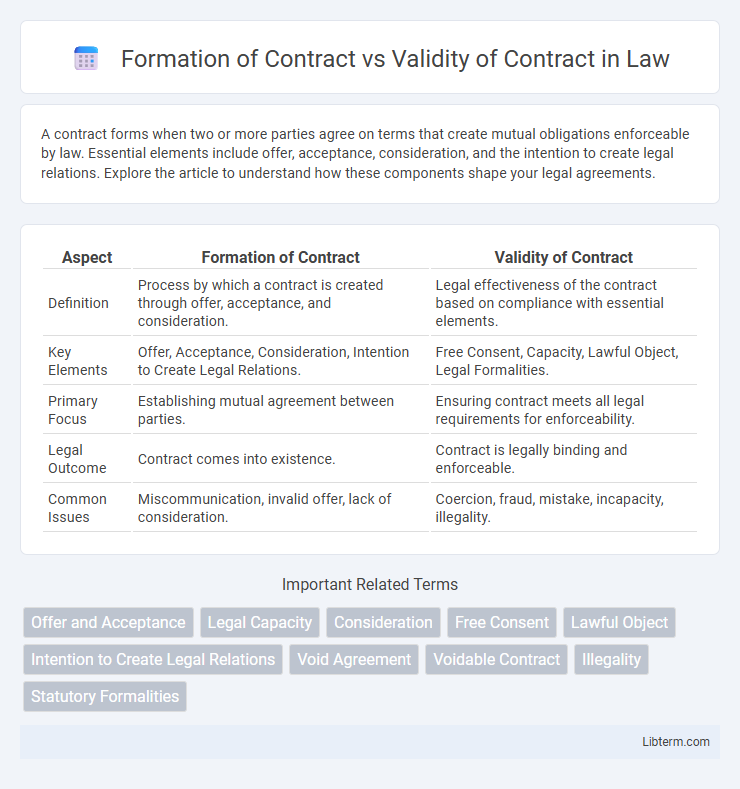A contract forms when two or more parties agree on terms that create mutual obligations enforceable by law. Essential elements include offer, acceptance, consideration, and the intention to create legal relations. Explore the article to understand how these components shape your legal agreements.
Table of Comparison
| Aspect | Formation of Contract | Validity of Contract |
|---|---|---|
| Definition | Process by which a contract is created through offer, acceptance, and consideration. | Legal effectiveness of the contract based on compliance with essential elements. |
| Key Elements | Offer, Acceptance, Consideration, Intention to Create Legal Relations. | Free Consent, Capacity, Lawful Object, Legal Formalities. |
| Primary Focus | Establishing mutual agreement between parties. | Ensuring contract meets all legal requirements for enforceability. |
| Legal Outcome | Contract comes into existence. | Contract is legally binding and enforceable. |
| Common Issues | Miscommunication, invalid offer, lack of consideration. | Coercion, fraud, mistake, incapacity, illegality. |
Introduction to Contract Formation and Validity
Contract formation involves the process of offer, acceptance, and consideration that creates a legally binding agreement between parties. Validity of contract assesses whether the agreement meets essential legal requirements such as capacity, consent, legality of purpose, and proper form. Understanding both formation and validity ensures that contracts are enforceable and effective under the law.
Defining Contract Formation
Contract formation involves the process of creating a legally binding agreement through offer, acceptance, consideration, and mutual intent. The validity of a contract depends on its compliance with legal requirements such as capacity, consent, legality, and form. Understanding contract formation is essential to distinguish between agreements that are merely negotiated and those enforceable by law.
Key Elements Required for Contract Formation
The formation of a contract requires key elements such as offer, acceptance, consideration, mutual intention to create legal relations, and capacity to contract, ensuring the agreement is legally binding. Validity of a contract depends on the presence of these formation elements along with legality of the object and free consent, which confirm that the contract can be enforced by law. Without these essential components, a contract may be formed but remain invalid or unenforceable in a court of law.
Overview of Contract Validity
Contract validity hinges on essential elements including offer, acceptance, consideration, and mutual consent, ensuring legal enforceability. Valid contracts must have competent parties, lawful subject matter, and genuine intention to create legal relations. The formation of a contract initiates these criteria, but validity confirms the contract's compliance with legal standards.
Essential Validity Requirements in Contracts
The formation of a contract requires a clear offer, acceptance, and consideration, establishing mutual consent between parties. Essential validity requirements include capacity, lawful object, and genuine consent, ensuring the contract is enforceable and legally binding. Absence of any element such as consent obtained by fraud or duress, or an illegal purpose, voids the contract's validity despite its formation.
Differences Between Formation and Validity
Formation of a contract refers to the process of creating a legally binding agreement through offer, acceptance, and consideration, establishing mutual consent between parties. Validity of a contract concerns whether the formed contract meets all legal requirements such as capacity, legality of purpose, and free consent, ensuring enforceability in a court of law. The key difference lies in formation being the creation phase, while validity assesses the legal soundness and enforceability of that created agreement.
Common Issues Affecting Contract Formation
Contract formation issues often arise from unclear offer and acceptance, lack of mutual consent, or ambiguous terms, leading to disputes over whether a contract truly exists. Validity concerns focus on meeting legal requirements such as capacity, lawful purpose, and consideration, without which contracts may be void or voidable. Common problems include misrepresentation, undue influence, and mistakes, which can invalidate an otherwise seemingly formed agreement.
Factors Impacting Contract Validity
Formation of a contract involves the mutual agreement between parties through offer, acceptance, and consideration, establishing the basic framework for a legally binding agreement. Factors impacting contract validity include capacity of parties, lawful object, free consent, and compliance with statutory requirements. Any defects in these elements, such as coercion, misrepresentation, or illegality, can render a contract void or voidable, affecting its enforceability.
Legal Consequences of Invalid Contracts
The formation of a contract involves offer, acceptance, consideration, and mutual consent, establishing a legally binding agreement between parties. Validity of a contract depends on legality, capacity, free consent, and lawful object, determining whether the contract can be enforced by law. Legal consequences of invalid contracts include nullity, unenforceability, and possible restitution, preventing parties from claiming rights or obligations under the agreement.
Best Practices for Ensuring Valid and Properly Formed Contracts
Ensuring a valid and properly formed contract requires clearly defined offer, acceptance, and consideration, meeting all legal requirements for enforceability. Best practices include thorough verification of parties' capacity, mutual consent, and lawful purpose, along with precise documentation of terms to avoid ambiguities. Employing standardized templates, seeking expert legal review, and maintaining transparent communication during negotiations significantly reduce risks of disputes and contract invalidation.
Formation of Contract Infographic

 libterm.com
libterm.com